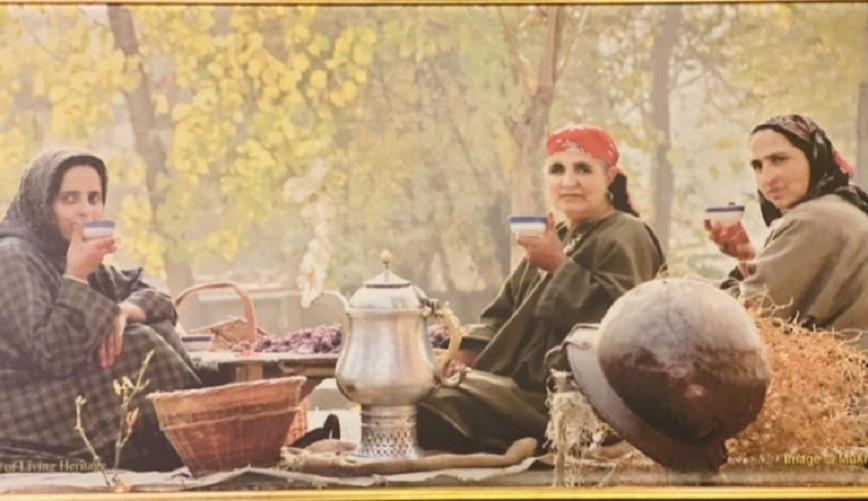
How A Kashmiri Cup Teaches Us To Slow Down
Representational photo
By Sabahat Fida
It began, quite ironically, with an Instagram reel.
A young woman was talking about how, in China, teacups are made without handles. The design, she said, carries a lesson in patience.
ADVERTISEMENTOne cannot sip from such a cup when the tea is too hot. One must wait, let it cool, and in that pause, learn stillness.
The cup becomes a vessel not just for tea, but for time.
As I watched, I felt something stir. The image of that cup seemed to echo an older, almost forgotten pulse of life in Kashmir.
We too once drank from handleless cups, our kashur paile: simple, curved, meant to be held and waited with.
Those cups have mostly disappeared from our homes, replaced by factory ceramics and imported glassware.
But in that older vessel lay a philosophy we have let slip away: that life, like tea, must sometimes be allowed to cool before it can be savoured.
This small thought led me deeper into the mystery of time, and how it feels increasingly lost to us.
There is always a race against the clock. Deadlines, reminders, check-ins, endless notifications. The hours pass like sand through fingers. My grandparents' lives, on the other hand, seemed filled with stories.
Every dinner with them was a long conversation about neighbours, weather, harvests, weddings, or even the latest quarrel over land. Their days unfolded slowly, and their memories grew thick around them.
When I look at my own life, I realise how little I might have to tell my daughter. Everything just passes too quickly for me to live it deeply.
My aunts once managed households of ten, fed children, washed clothes, served elders, and still found time to gossip, spin pashmina, and share stories that lasted through winter nights. Their work was hard, but it was meaningful.
I, meanwhile, measure my hours by alarms and logins.
Our time feels shorter, because we fill them with less substance. A study on the“Perception of Time in Accelerated Cognition” by researcher Youvan (2024) suggests that time feels longer when the mind is rich with varied experiences.
When life is full of vivid events, the brain registers more“moments,” and time stretches. And when the day is dull or repetitive, those mental markers vanish, and time collapses. The day ends before we have truly inhabited it.
Perhaps this is why our years feel shorter now. We live in fragments, moving from one distraction to another. Attention itself has become the rarest indulgence.
The word begar carries an old weight in Kashmir. It recalls the Dogra era, when men were taken from their homes to perform unpaid labour for the rulers. They built roads, carried logs, cut stones, never knowing when they would return. The word survives in our speech as shorthand for any toil that feels endless and unrewarded.
Sometimes I feel we are living a new kind of begar.
We work for invisible masters now. Algorithms pull our thoughts, gestures, and desires. Every scroll, like, and“update” is labour disguised as leisure. We sit still, but our minds are whipped into constant movement. Our attention, once our own, has become the new unpaid labour.
By evening, when the phone battery dies, I feel the fatigue of a worker who has spent the day toiling on something shapeless. It's a kind of exhaustion without evidence.
This surrender of attention reminds me of an experiment from the 1970s, John B. Calhoun's“Universe 25.”
It was meant to be a paradise for mice: plenty of food, without predators. For a time, the colony flourished. Then, gradually, it collapsed.
The mice stopped mating. Mothers abandoned their young. The males grew listless or violent. And there appeared a strange group called“the Beautiful Ones”, mice who spent their days grooming, isolated, unbothered, immaculate. They lived without purpose until the colony died out entirely.
Calhoun called it the“behavioural sink.” It was a warning about abundance without struggle, comfort without meaning.
When purpose disappears, so does life itself.
I often think of that experiment when I walk through Srinagar's new cafés, glowing with soft lights and perfect interiors. People sit with their phones, their faces lit by screens, while their coffees growing cold.
We are the Beautiful Ones now, well-groomed, endlessly scrolling, and detached from the texture of real life. Surrounded by comfort, we have grown restless.
This is not to say that technology or progress are the villains. They are, in a way, the new teacups we drink from: sleek, modern, and efficient.

Legal Disclaimer:
MENAFN provides the
information “as is” without warranty of any kind. We do not accept
any responsibility or liability for the accuracy, content, images,
videos, licenses, completeness, legality, or reliability of the information
contained in this article. If you have any complaints or copyright
issues related to this article, kindly contact the provider above.


















Comments
No comment